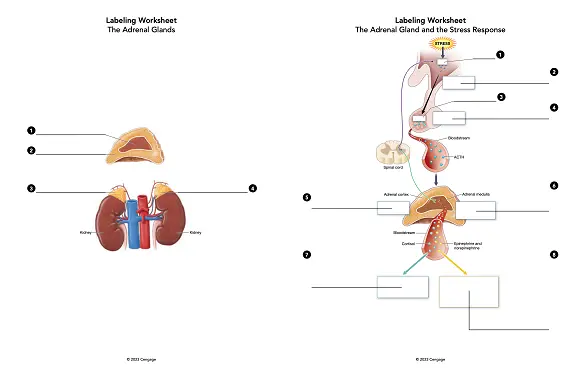Question
Labeling Worksheet The Adrenal Glands and the Stress Response STRESS 1 2 3 A Bloodstream 2 -ACTH Spinal cord 3 4 Adrenal cortex – Adrenal medulla Bloodstream – Cortisol Epinephrine and norepinephrine 2023 Cengage 2023 Cengage
Labeling Worksheet The Regulation of Thyroid Hormone Production 9 2023 Cengage
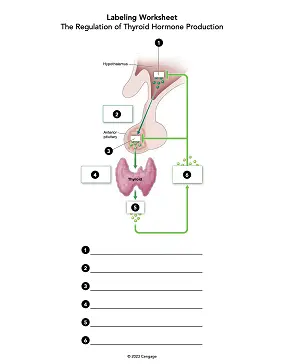
Answer
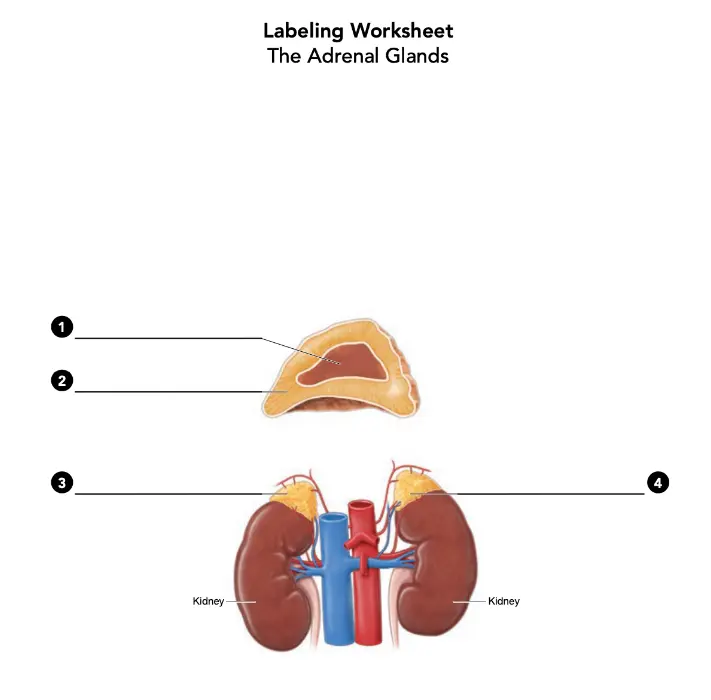
| Name | Function / description | |
| 1. | Adrenal medulla | The part of the adrenal gland responsible for producing epinephrine and norepinephrine (adrenaline) which affects on blood pressure and bodily stress responses. |
| 2. | Adrenal cortex | The part of the adrenal gland that produces glucocorticoids (cortisol), mineralocorticoids (aldosterone), and androgens (sex hormones). |
| 3. | Right adrenal gland | has pyramidal shape |
| 4. | Left adrenal gland | has crescentic shape |
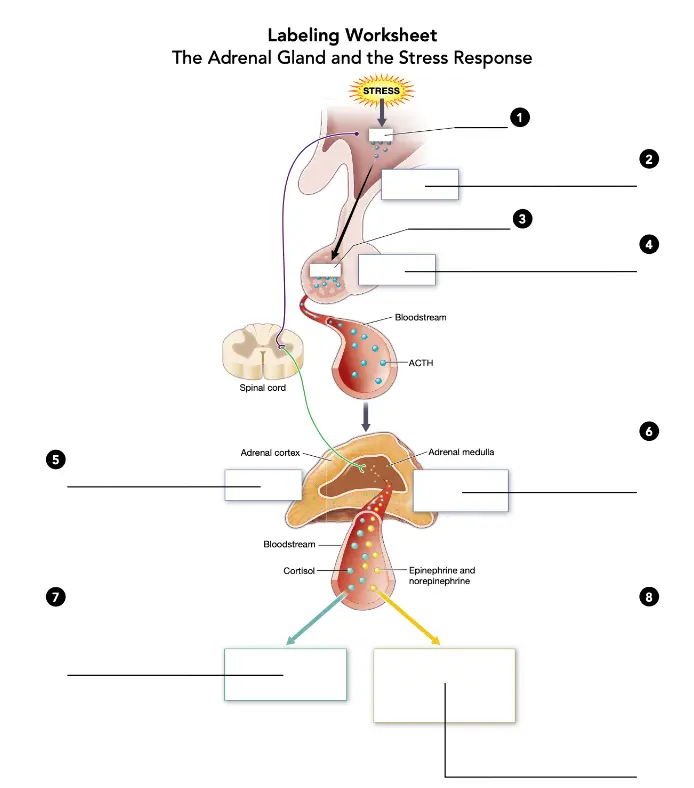
1. Corticotropin Releasing Hormone (CRH)
2. CRH stimulates the release of corticotropin (ACTH) from the anterior pituitary gland.
3. Corticotropin (ACTH)
4. ACTH is released from the anterior pituitary gland and will directly act on the adrenal glands
5. ACTH stimulates the release of glucocorticoids (cortisol) and mineralocorticoids (aldosterone) from the adrenal cortex.
6. ACTH stimulates production and release of epinephrine and norepinephrine from the adrenal medulla
7. Aldosterone and Cortisol will activate the long term stress response. Aldosterone will cause retention of sodium ions and water by kidney thereby increased blood volume and blood pressure. Cortisol will cause breakdown of protein and fats leading to increased blood glucose. Elevated glucocorticoids and mineralocorticoids inhibit the release of corticotropin from the anterior pituitary gland as well as release of CRH by the hypothalamus
8. Epinephrine and norepinephrine will activate the short-term stress response which includes increased glycogen breakdown, increased blood pressure, increased metabolic rate, and increased breathing.
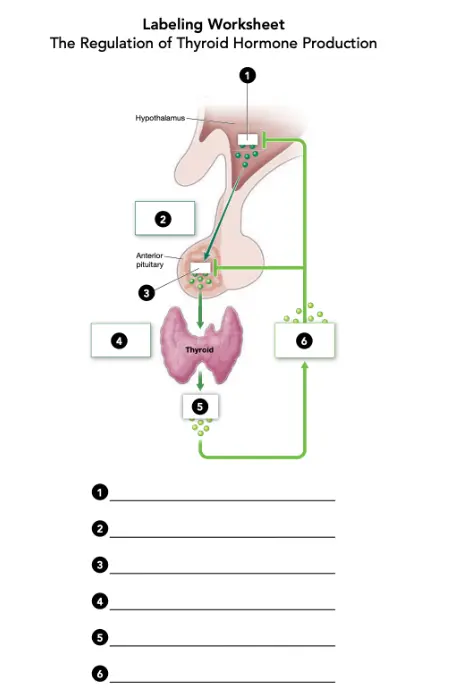
1. Low blood levels of T3 and T4 stimulates the release of Thyrotropin- Releasing Hormone (TRH) from the hypothalamus
2. TRH is carried by the portal veins to the anterior pituitary gland. It stimulates the gland to release Thyroid stimulating hormone (TSH)
3. Thyroid stimulating Hormone (TSH)
4. TSH is released into the blood and acts directly on the thyroid gland stimulating the thyroid follicular cells to produce and release T3 and T4
5. Thyroid hormones (T3 and T4) are released into the blood by the follicular cells
6. Elevated concentration of the thyroid hormones inhibits the release of TRH and TSH via negative feedback mechanism
Table of Contents
How the Adrenal Glands Affect Your Health
The adrenal glands, although small in size, are powerful structures situated above each kidney that play a crucial role in maintaining overall health and well-being. Despite being small, these glands are responsible for producing a variety of hormones that regulate essential bodily functions, ranging from stress response to metabolism. Understanding the impact of adrenal glands on your health can offer insights into various health issues and ways to uphold a balanced lifestyle.
The Adrenal Glands’ Structure and Function
Comprised of two distinct parts, the adrenal glands consist of the adrenal cortex and the adrenal medulla, each responsible for producing different hormones with unique functions in the body.
The Adrenal Cortex
The outer layer of the adrenal glands, known as the adrenal cortex, generates hormones like cortisol, aldosterone, and androgens.
- Cortisol: Commonly known as the “stress hormone,” cortisol aids in regulating metabolism, reducing inflammation, and controlling the sleep-wake cycle. It plays a crucial role in the body’s response to stress.
- Aldosterone: Vital for maintaining blood pressure and the balance of sodium and potassium in the blood.
- Androgens: Contribute to the development of secondary sexual characteristics, impacting muscle mass and libido.
The Adrenal Medulla
The inner part of the adrenal glands, the adrenal medulla, produces catecholamines, including adrenaline (epinephrine) and noradrenaline (norepinephrine). These hormones are essential for the body’s fight-or-flight response, preparing the body to react to stressful situations by increasing heart rate, blood pressure, and energy levels.
The Influence of Adrenal Glands on Health
Given their role in hormone production, the adrenal glands significantly affect various aspects of health. Here are key ways they influence overall well-being:
Stress Response
Central to the body’s ability to manage stress, the adrenal glands release cortisol and adrenaline during stressful situations, mobilizing energy reserves, enhancing alertness, and preparing the body for action. Prolonged stress may lead to excessive cortisol production, causing health issues like weight gain, high blood pressure, and a compromised immune system.
Metabolism and Energy Levels
Cortisol also impacts metabolism by influencing how the body processes carbohydrates, fats, and proteins. Proper adrenal gland function ensures energy levels are sustained throughout the day, while imbalances can result in fatigue and metabolic disturbances.
Blood Pressure Regulation
Aldosterone is crucial for maintaining blood pressure by balancing sodium and potassium levels in the blood. Hormone dysregulation can lead to conditions like hypertension or hypotension.
Immune System Function
Cortisol possesses anti-inflammatory properties and helps regulate the immune system. Adequate cortisol levels are necessary for proper immune function, but chronically high levels can suppress immunity, making the body more susceptible to infections and diseases.
Frequent Adrenal Gland Disorders
Disorders of the adrenal glands can have significant health implications. Some common disorders include:
Addison’s Disease
Characterized by insufficient cortisol and aldosterone production, manifesting symptoms like fatigue, muscle weakness, weight loss, and low blood pressure. Treatment typically includes hormone replacement therapy.
Cushing’s Syndrome
Caused by excess cortisol production, leading to symptoms such as weight gain, high blood pressure, diabetes, and osteoporosis. Treatment may involve medication, radiation, or surgery to reduce cortisol levels.
Adrenal Insufficiency
Also known as adrenal fatigue, it occurs when the glands don’t produce enough hormones during stressful periods, resulting in fatigue, body aches, and low blood pressure. Treatment focuses on managing stress and supporting adrenal function through lifestyle adjustments and, in some cases, hormone therapy.
Promoting Adrenal Health
Maintaining adrenal gland health is vital for overall well-being. Here are some tips to support adrenal health:
Handle Stress: Incorporate stress-reducing techniques such as mindfulness, meditation, and regular physical activity.
Balanced Diet: Ensure your diet includes a variety of nutrients like vitamins B and C, magnesium, and healthy fats to support adrenal function.
Adequate Sleep: Prioritize sleep to allow your body to recuperate and regulate hormone production.
Hydration: Proper hydration aids overall health and maintains the electrolyte balance regulated by the adrenal glands.
Regular Check-Ups: Routine medical check-ups can help detect and address any adrenal gland function issues early on.
Conclusion
The adrenal glands, though small, wield significant influence on your health. By grasping their functions and how they impact bodily processes, you can take measures to promote their health and enhance overall well-being. Simple lifestyle changes, from stress management to a balanced diet, can profoundly impact ensuring optimal adrenal gland function.

